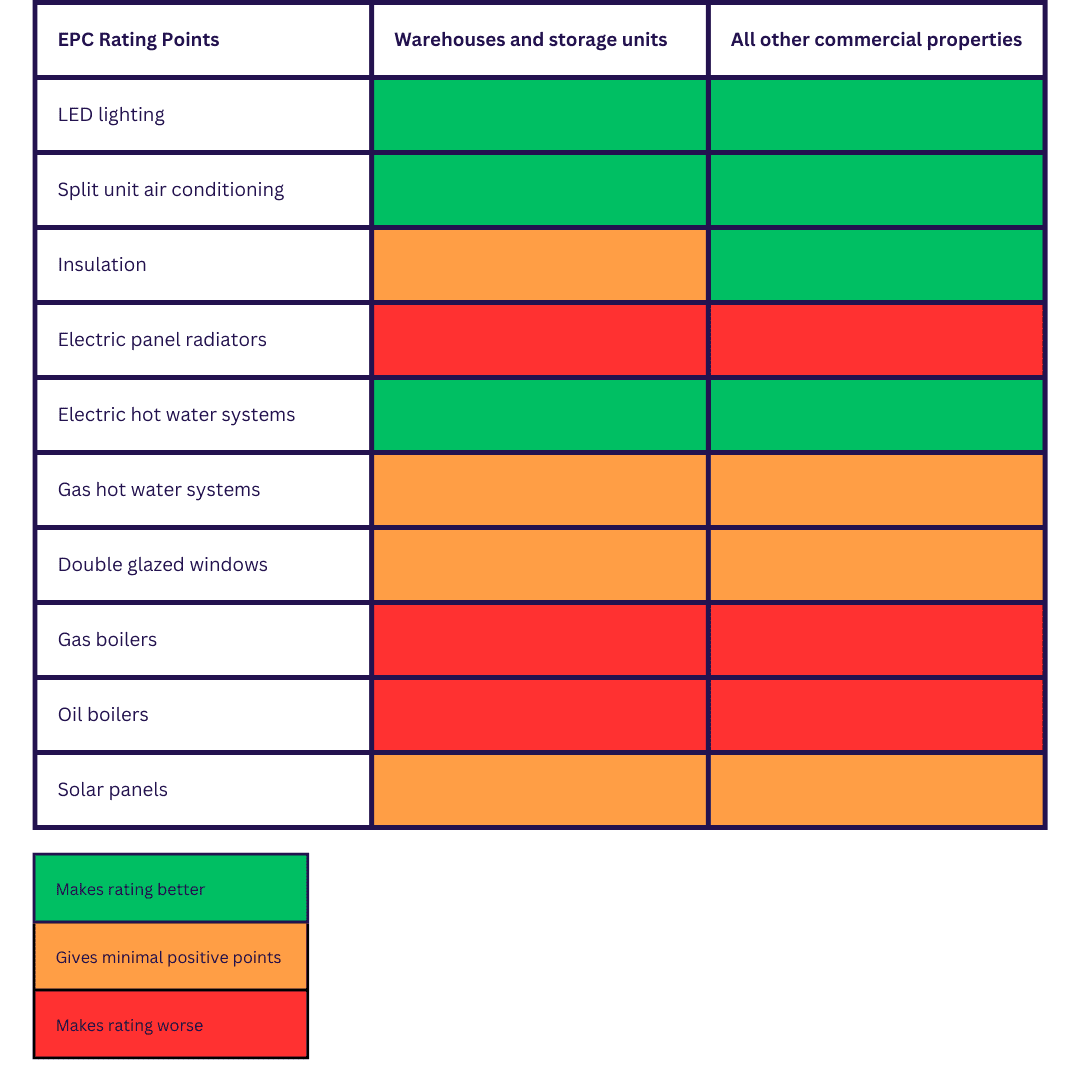28/02/2024
Insights
What is an EPC?
An energy performance certificate (EPC) ranks how energy-efficient a building is, from A (very efficient) to G (inefficient), whilst also providing recommendations for improvements.
As it offers potential tenants, buyers and landlords with a greater understanding of what their future energy bills will look like, the higher the EPC rating, the more desirable a property becomes.
EPC Regulations
As of 2008, it is a legal requirement to show an EPC rating before being able to sell, rent and extend the lease of a property.
However, with the updated Minimum Energy Efficiency Standards (MEES) regulations in April 2023, all non-domestic rented properties must now have an EPC rating of E or higher, aside from acute exemptions.
Those not compliant can be significantly fined depending on the property’s rateable value and the extent of the breach, with the maximum penalty being £150,000.
Why go above and beyond?
Aside from purely being able to meet current requirements, investing resources into maximising the energy performance of your property will reap further benefits.
Ensuring greater energy efficiency compliance now will guarantee long-term conformity
From 2027, commercial properties will not be able to be let without an EPC rating of C with the compliance window commencing as early as 2025. As of 2030, this will be further increased to a B rating.
With the demand for more energy-efficient properties being at an all-time high, better EPC certificates will result in a more valuable property
Investing in your property's EPC score is therefore more than just a regulatory constraint, it is an investment in sustainability, marketability, and long-term value creation to maximise tenant attraction and retention.
Greater energy efficiency will result in lower utility bills as both a tenant and a property owner
The lower operating costs make for a more desirable business investment and can even result in improved rates from banks, as well as increase the chances of eligibility for government incentives and grants.
Strategies for Enhancing Your EPC Rating
Elevating your property's EPC rating requires a multifaceted approach that addresses various aspects of energy consumption and efficiency:

Upgrade to LED lighting:
Lighting plays a significant role in energy consumption as according to the International Energy Agency (IEA), it can account for up to 40% of total energy consumption in commercial buildings.
LED bulbs are seen as today’s most energy-efficient lighting option since they use up to 90% less energy and can last 25 times longer compared to traditional incandescent bulbs.
Switching to LEDs will therefore greatly enhance your EPC as it is a low-cost, high-impact solution that enhances both the aesthetics, functionality and energy efficiency of your property.
Opt for efficient air conditioning systems:
Investing in split-unit air conditioning systems can contribute positively to your EPC rating as well as offering a multitude of additional benefits, such as improved air quality and comfort.
The systems are designed to offer efficient cooling while minimising energy consumption by running at different speeds depending on the ambient temperature. Coupled with their ease of maintenance and long life spans, split-unit air conditioning systems are proving to be a worthwhile investment.
Enhance insulation:
While only minimally impacting the EPCs of warehouses and large storage units due to their greater chance of heat loss, investing in sound insulation is still vital for all other commercial properties. According to Northern Energy, as much as 45% of heat is lost through walls and 20% through roofs.
Energy Saving Trust estimates that for detached homes, installing 270mm of insulation on an uninsulated loft can save up to £445 annually on energy bills and solid wall insulation can save up to £660. With commercial buildings being even more challenging to make energy efficient due to their large scale, the saving potentials would be even greater.
Choose heating systems wisely:
The heating system you choose for your property will have a huge influence on the EPC. While generally boasting cheaper operating costs, using gas and oil boilers will significantly drop EPC ratings regardless of your commercial property due to the burning of fossil fuels and subsequent contribution to global warming.
As offsetting your carbon emissions is vital, opting for electric heaters in non-domestic properties other than warehouses will increase EPC ratings since they offer greater efficiency in addition to longer lifespans and lower maintenance/installations costs.
However, in warehouses and large storage units, electric heaters will not be as suitable and will negatively impact EPCs owing to their limited capacity. Depending on factors such as the size and purpose of the warehouse, different heating methods will be more suitable than others. Other options include industrial fan heaters, destratification units and quartz halogen heaters.
Adopt energy-efficient hot water systems:
A similar case can be made for electric hot water systems over gas systems. The aversion of burning fossil fuels will help boost your EPC while offering higher energy efficiency in modern models. They are also simpler to install and maintain but still have higher operating costs due to the price of electricity.
Being smart with double glazing:
Opting for double glazing over single will of course help with making the property more efficient as heat is lost through single glazed windows up to twice as fast. However, our findings show that investing heavily into double glazed windows may not make as positive of an impact on improving commercial EPC ratings as potentially expected.
Instead, other more significant factors such as the age of the building and the total number of windows in the building may dictate the effectiveness of double glazing on EPC scores.
When to consider renewable energy solutions:
While solar panels have a hugely positive impact on residential properties, we have found that they may also not make as massive an impact at immediately increasing commercial EPCs. Achieving at least a rating of D from other methods should be a priority first before considering implementing solar as a means of reducing your carbon footprint.
Eddisons
At Eddisons, we specialise in providing sustainable solutions, helping clients develop their decarbonisation plans.
Regardless of your objectives, our dedicated decarbonisation team is on hand to advise you on how to meet Net Zero targets. From the initial decarbonisation planning process, assistance with funding applications and guidance on financing options, through to the actual implementation of energy and cost saving initiatives.






